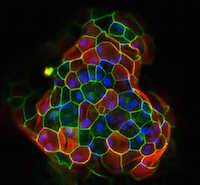Members Login

Channels
Special Offers & Promotions
Organoid Biobank for Predicting Cancer Patient Response to Drugs
AMSBIO reports on a study, published in Cell (1), that demonstrates the power of organoids to capture, in three dimensions, the multiple mutations that occur in tumours.
 Organoids, small clusters of cells that accurately mimic the behaviour of human tissue, can be used to test cancer drugs and, eventually, to identify effective personalised treatments for patients.
Organoids, small clusters of cells that accurately mimic the behaviour of human tissue, can be used to test cancer drugs and, eventually, to identify effective personalised treatments for patients.
In the described research samples from healthy tissue and cancerous tissue were taken from 20 patients with colorectal carcinoma and used to form the organoids. The organoids were then exposed to a range of colorectal cancer treatments as part of a high-throughput drug screen, which is testing hundreds of different drugs against cancer cell lines.
Until now, cancer drug screening has primarily been carried out using 2D cell lines grown in dishes, or in mouse models. Organoids, which more closely resemble human tumours than cell lines, and are less time and resource intensive than mouse models, offer researchers a middle ground between existing approaches. These exciting findings are the result of an international collaboration involving research teams in the UK, Netherlands, and the US.
The collaborative research teams are now building a biobank of organoids that will help to illuminate the complex interactions between the multiple genomic alterations in tumours that determine which drugs work and which don't. Organoids could ultimately be used in the clinic to predict how a patient will respond to treatment. However, researchers say that more work to speed up and standardise the process of producing and testing organoids is needed before this is possible. In the short term, organoids are likely to speed up the process of developing new cancer treatments and reduce costs.
AMSBIO’s wide range of matrices and other solutions for 3D cell culture include natural hydrogels, recombinant matrices, artificial scaffolds and scaffold-free supports. Recently AMSBIO introduced two novel formulations of Basement Membrane Extract (BME2 and BME3) to address the heterogeneous nature of tissue and organ microenvironments that not only arise from organ specific stromal cells, growth factors, proteoglycans, and protein composition but also from the stiffness or tensile strength of the BME. Matrices from AMSBIO not only support cells and cell layers, but also play an essential role in tissue organization that affects cell adhesion, migration, proliferation, and differentiation. These aspects can be studied with tools from AMSBIO and the company’s experience in developing specialist matrices includes regulatory friendly solutions for regenerative medicine applications where customers are already in clinical trials.
Media Partners


